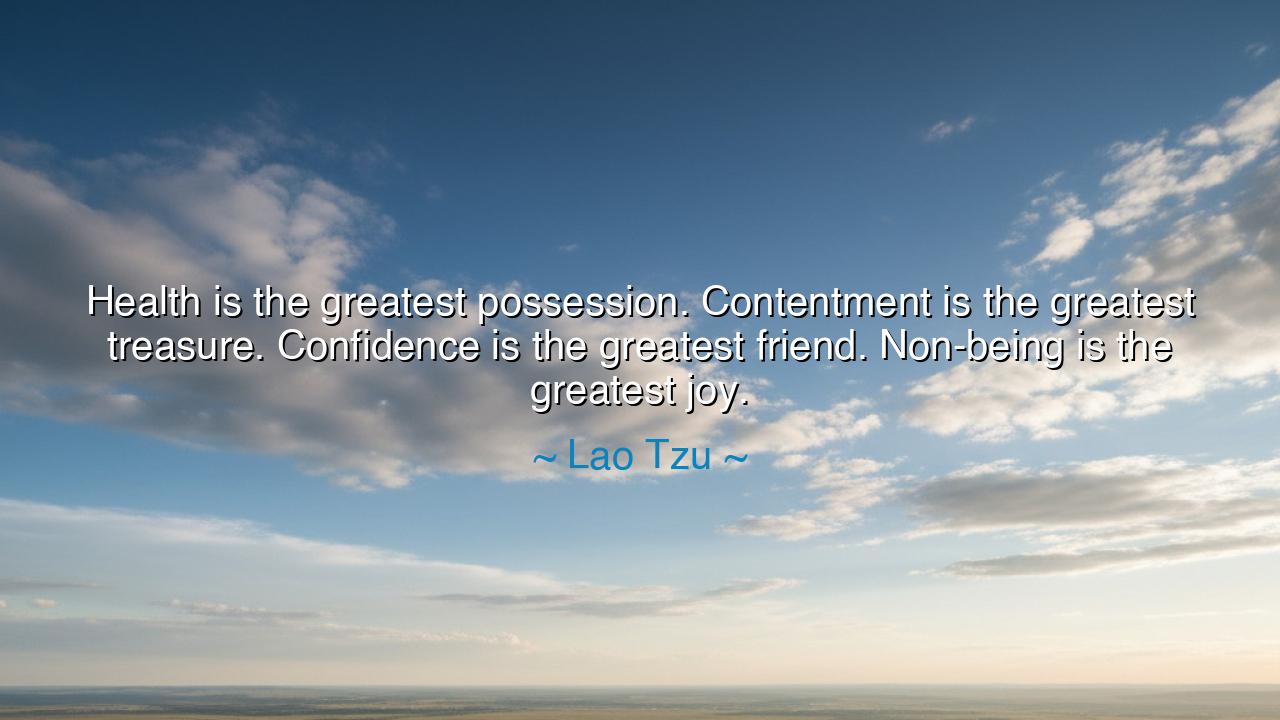
Health is the greatest possession. Contentment is the greatest
Health is the greatest possession. Contentment is the greatest treasure. Confidence is the greatest friend. Non-being is the greatest joy.






In the serene wisdom of Lao Tzu, the sage of the Tao, there flows a teaching as clear as the mountain spring and as deep as the ocean’s stillness: “Health is the greatest possession. Contentment is the greatest treasure. Confidence is the greatest friend. Non-being is the greatest joy.” These words, though simple, contain the essence of all philosophy — the secret of living well and dying without fear. They are not the commands of a ruler nor the dogma of a priest, but the gentle guidance of one who saw through the illusions of the world and found peace in the eternal rhythm of the Tao, the Way.
When Lao Tzu declares that health is the greatest possession, he speaks as one who has witnessed empires rise and fall, wealth gathered and lost, power gained and wasted. For what are gold and glory to the man who cannot rise from his bed? What is all the wealth of the world to one whose body is broken or whose breath falters? To be in harmony with life — to eat with moderation, to move with grace, to let the mind rest as the body restores — this is the first and greatest wealth. The ancients knew that the body is not a servant to the mind, but its sacred companion. When it is honored, strength grows; when it is neglected, no treasure can buy peace.
He continues, saying that contentment is the greatest treasure, for the man who desires nothing possesses everything. The hungry heart is never full; the restless mind is never rich. In this, Lao Tzu teaches the art of sufficiency — to delight in what is, rather than ache for what is not. The wise do not measure their lives by accumulation, but by appreciation. The peasant who sleeps beneath the stars with gratitude is richer than the king who counts his coins in fear of loss. Contentment is the alchemy that turns even poverty into abundance, for it transforms every small joy into gold.
Confidence, says Lao Tzu, is the greatest friend. Yet this confidence is not arrogance, not the noisy pride that boasts before men. It is the quiet assurance of one who walks with the Tao, who trusts in the unfolding of life. Such confidence arises from self-knowledge — from knowing one’s nature, one’s path, one’s purpose. The wise do not seek validation from the crowd; they are anchored in their own spirit. For when storms arise, it is confidence, not companionship, that steadies the soul. Many have friends in fortune, but few have the steadfast friend within — the courage to stand alone, and the calm to face what comes.
And then, most mysterious of all, Lao Tzu speaks of non-being as the greatest joy. What does he mean by this? In the West, we fear the void — we dread emptiness, as though it were death. But to Lao Tzu, non-being is not annihilation; it is freedom. It is the release from striving, the surrender of ego, the peace that comes when one ceases to fight the flow of the world. Just as a cup is useful not for its clay but for its emptiness, so too is the human spirit fulfilled when it lets go of the self and becomes one with the infinite. In the quiet of non-being, there is no pain, no fear, no separation — only the boundless joy of unity with the Way.
The story of the monk and the emperor may serve to illustrate this truth. Once, an emperor asked a sage to carve for him the secret of happiness. The monk carved a single word: “Contentment.” The emperor frowned. “Is that all?” he asked. The monk smiled and added another: “Simplicity.” The emperor pondered the message and realized that his palaces and armies had brought him neither peace nor health. Only when he learned to live humbly — to eat when hungry, to rest when weary, and to see the divine in all things — did he find the serenity he had long sought. So too do Lao Tzu’s words guide us: to treasure the simple and to trust the unseen.
The lesson is eternal: guard your health as your true wealth; seek contentment, not indulgence; cultivate inner confidence, not arrogance; and learn, at last, to embrace non-being — the stillness beyond thought and desire. Live as water flows: freely, humbly, without resistance. The wise man does not chase joy; he allows it to find him when he is still.
So, O seeker of the Way, remember this teaching of Lao Tzu: “Health is the greatest possession. Contentment is the greatest treasure. Confidence is the greatest friend. Non-being is the greatest joy.” It is not a riddle, but a path — one that leads from noise to silence, from craving to peace, from illusion to truth. Walk it gently, live it daily, and you will find that what the world calls small is, in truth, the measure of all greatness.






AAdministratorAdministrator
Welcome, honored guests. Please leave a comment, we will respond soon